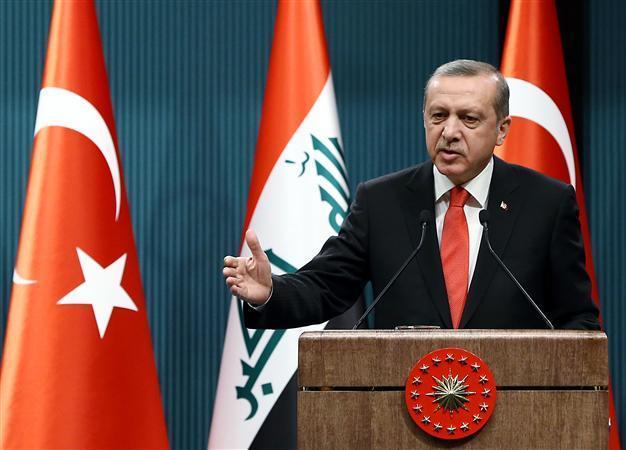Ankara does not expect Obama to say ‘genocide’
ANKARA / WASHINGTON

AA Photo
Turkish President Recep Tayyip Erdoğan said April 22 that he did not expect the U.S. President Barack Obama to use the word “genocide” in a statement to mark the 100th anniversary of the killing of Armenians at the hands of the Ottoman Empire.“I would not like to hear such a thing from Mr. Obama. And I do not expect such a thing,” Erdoğan said during a joint press meeting with visiting Iraqi President Fuad Masum in Ankara.
He was responding to a question upon news reports that Obama would avoid such an expression.
“The place of Turkey in the eyes of the U.S. and its stance in these incidents are obvious,” said Erdoğan.
He and Obama had discussed the issue repeatedly in the past, the president said, repeating his stance that the Armenian killings should be left to historians.
The debates on the issue are disturbing Turkey’s 100,000 citizens of Armenian origin, he said, allocating himself the right to speak on their behalf.
The White House avoided referring to the World War I killings of Armenians as genocide on April 21, as a diplomatic row raged ahead of the anniversary.
White House chief of staff Denis McDonough and one of Obama’s top foreign policy advisers hosted Armenian-American leaders at the White House to discuss the centennial.
McDonough and Deputy National Security Advisor Ben Rhodes “discussed the significance of this occasion for honoring the 1.5 million lives extinguished during that horrific period,” the National Security Council said in a statement.
Sticking to the White House’s avoidance of the term, the statement said the United States would “use the occasion to urge a full, frank and just acknowledgement of the facts.”
Armenian leaders who met with the administration officials said they were told Obama would not use the term.
“His failure to use the term genocide represents a major blow for human rights advocates and sets the clock back on genocide prevention,” Armenian Assembly of America Director Bryan Ardouny told the AFP.
A senior administration official also confirmed in a statement to Tolga Tanış, the Washington correspondent of daily Hürriyet, that “the president will make a statement that marks the historical significance of this centennial, and – as in past years – mourns the senseless loss of 1.5 million precious lives in the atrocities known as the ‘Meds Yeghern,’” an Armenian term meaning “great calamity.”
“We know and respect that there are some who are hoping to hear different language this year. We understand their perspective, even as we believe that the approach we have taken in previous years remains the right one – both for acknowledging the past, and for our ability to work with regional partners to save lives in the present,” the official said.
National Security Advisor Susan Rice met with Turkish Foreign Minister Mevlüt Çavuşoğlu and encouraged him to “improve relations with Armenia,” as well as have open dialogue in Turkey about the “atrocities of 1915,” according to a statement.
During his 2008 campaign for the White House, then-senator Obama had pledged to “recognize the Armenian genocide,” but preferred the term Meds Yeghern throughout his presidency.
Prime Minister Ahmet Davutoğlu, meanwhile, said he called German Chancellor Angela Merkel and requested her involvement as German parliament is scheduled to vote on a resolution on April 24 declaring the mass killings of Anatolian Armenians as an example of genocide.
“During a lengthy telephone conversation with Ms. Merkel yesterday [April 21], I requested her to be in charge so that the German parliament would not make a decision which would offend Turkey,” Davutoğlu said April 22, while speaking at a joint press conference with Australia’s visiting prime minister, Tony Abbott.
Germany has long resisted using the term “genocide” even though France and other nations have. But Merkel’s coalition government came under pressure from parliamentary deputies in their own ranks planning to use the word in a resolution.
Earlier this week, the chancellor’s spokesperson, Steffen Seibert, said the government would support a resolution in parliament on April 24 declaring it an example of genocide.
















